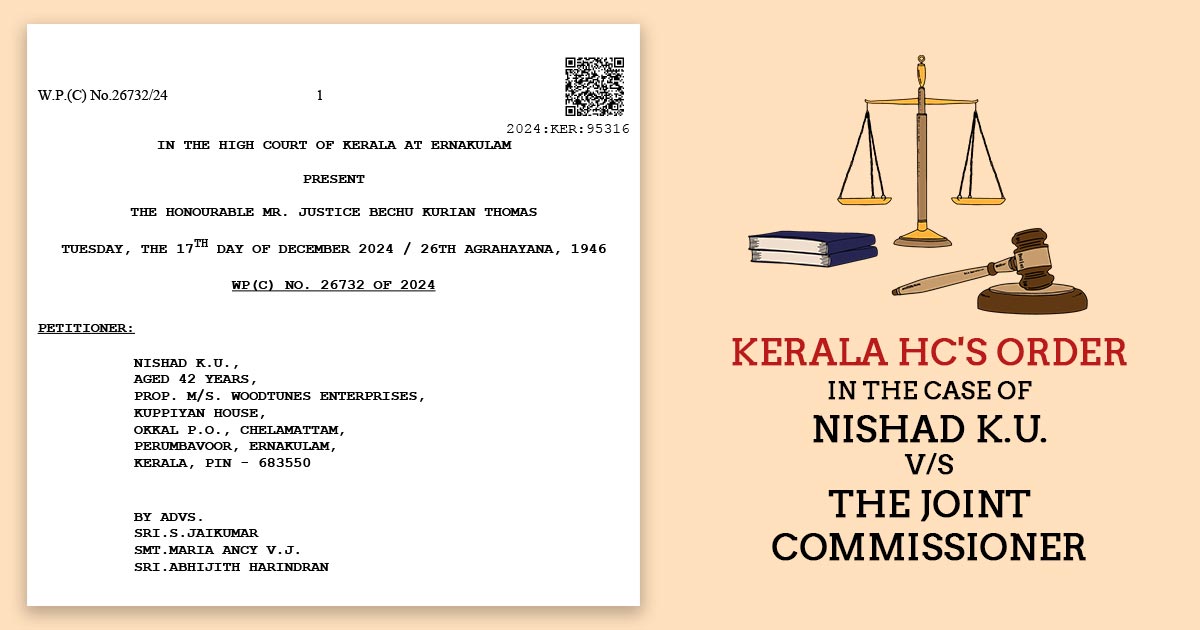
In a case, the High Court of Kerala has viewed that failure to grant an opportunity for cross-examination upon charging penalty under the Central Goods & Services Tax Act, 2017 (CGST Act) breaches the principles of natural justice and set aside the said order.
The applicant, Nishad K.U., is a registered taxpayer as per the Goods and Services Tax (GST) regulations. In addition to the further sum of Rs. 9.40 Crores u/s 122(1) of the State Goods & Services Tax Act, 2017 (the “SGST Act”), he challenges an order that assesses a penalty exceeding Rs. 9.40 Crores u/s 74(9) of the Central Goods & Services Tax Act, 2017 (the “CGST Act”), and consequential interest and other penalties.
The applicant even after having the authority to plea u/s 107 of the CGST/SGST Act has invoked the jurisdiction of Article 226 of the Indian Constitution, claiming that the impugned ruling breached natural justice principles.
The applicant is the owner of M/s. Wood Tunes Enterprises, a plywood company. The applicant sought to elaborate on the reason for the penalty recommended in the Show cause notice (SCN) must not be applicable for the alleged intended misstatements and suppression of facts to prevent the GST payment.
As per the report, there were 20 distinct people’s statements were received, depicting that the applicant is in the bogus registrations and sales suppression to get an excessive amount of the input tax credit.
Apart from disapproving all of the accusations, the applicant urged for the opportunity to verify the individuals from whom the statements were taken purportedly.
Also, the applicant said that the statements were all retracted and that they were received under duress. The applicant was heard dated January 31, 2024, and afterwards, on February 7, 2024, the process for cross-examination was denied of the applicant.
The applicant has submitted another reply that has three affidavits of retractions from those who had supposedly pushed comments.
It was sought by the applicant that the proceedings be withdrawn and that they be provided another chance to be cross-verified. The first respondent went forward and furnished the final order putting the obligation on the applicant, overlooking the request for cross-verification.
It was noted that the applicant is in a bogus activity via the PAN and Aadhaar card information of the other people referred to as “goalies” in local trade jargon. Through the misuse of the invoice and the e-way bills a carousal of the ITC in various states is been created to allow the covert supply of the plywood in the names of goalies who were merely name lenders in the transactions and who were thereafter serviced via other goalies.
From reading section 107(11) of the Act it is clear that the Appellate Authority does not have the authority to remand the case in the case that the challenged order has any issues or even when the natural justice norms are violated. Merely the order that is being appealed against might be verified, altered, or revoked via the Appellate Authority.
As per the applicant via refusing the people whose statements the tax authorities have recorded the chance to get cross-examined, the principles of natural justice have been breached. For the same, it is significant to mark that section 75(4) of the Act only mandates a chance for hearings; it makes no remark of the chance for cross-review of the witnesses.
The adjudicating authority in the challenged order cited that the applicant is not required to be allowed the cross-verification as it will not compromise the validity of the proof collected via the testimonies of those witnesses who were on file.
It was concluded by the Adjudicating Authority that the request for the cross-examination does not have the substance post analysing many rulings and making the critical observations.
Read Also: ITC Under Section 16(2)(c) Rejected: Kerala HC Grants Benefit Based on GST Circular
It was assumed by the single bench of Justice Bechu Kurian Thomas that the principles of natural justice had been broken by not providing the applicant an opportunity for cross-verification and via the use of the remarks of the people to charge the punishment.
The challenged ruling of May 29, 2024, is overturned and the first respondent is asked to again analyse the matter post providing the individuals whose statements were received at the time of the investigation an opportunity to be again examined.
| Case Title | Nishad K.U. vs. The Joint Commissioner |
| Citation | WP(C) NO. 26732 OF 2024 |
| Date | 17.12.2024 |
| Petitioner by: | Sri.S.Jaikumar, Smt.Maria Ancy V.J., and Sri.Abhijith Harindran |
| Respondents by | Sri.R.Harishankar, and Sri.Sreelal N.Warrier |
| Kerala High Court | Read Order |









